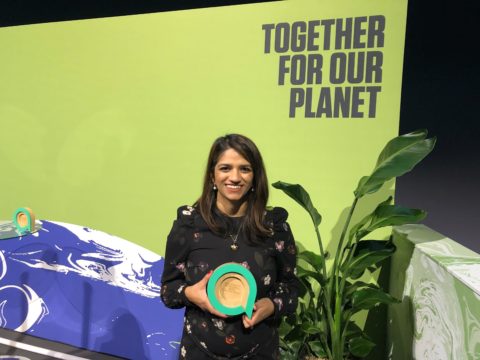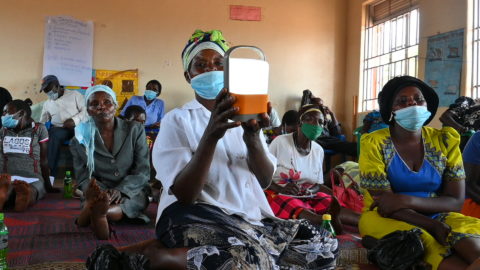
Aneri Pradhan, Chief Operating Officer at New Energy Nexus
Aneri is starting as our Chief Operating Officer, helping lead the work to scale our organizational impact around the world. But it’s not her first experience with New Energy Nexus, having founded ENVenture in Uganda (which NEX eventually partnered with), as well as previously sitting on our global Board.
She has over a decade of experience working in 15 countries across four continents on clean energy and climate technology adoption – topics she has a deep passion and expertise in. We took a moment to ask her a few questions:
New Energy Nexus has rapidly expanded, in fact half the staff now working with us have joined since the pandemic started. That’s a lot of operational fixes, from scaling existing processes to building new ways of working and onboarding. My big priority right now is improving employee wellbeing: how do we make New Energy Nexus a place where people feel like they’re part of something truly global when their day to day might not be. This is hard when everyone works remotely: how do we build that sense of community through our computers?
What I’ve learned from experience is that solidarity is key. Government, private and civil society must work hand-in-hand. The government needs to reduce barriers to increase the uptake of clean energy and stop favoring fossil fuels. The private sector must fill the financing gap: there must be more investment and development of financial facilities to support clean energy growth. And finally, civil society understands local contexts and can ensure 100% of clean energy actually benefits 100% of the population.
It was a matter of being at the right place, at the right time, and with the right set of skills. I went to India right after grad school and ended up volunteering at a community-based organization called the Auroville Village Action Group. They worked in local communities, including on energy access – a lot of homes didn’t have power, access to modern cooking methods, and clean water was often contaminated from seasonal typhoons. But the problem was that this CBO did not have the technical know-how and they didn’t know how to build a business, which is where I stepped in.

An energy entrepreneur in Uganda testing the lighting capability of a solar lantern during a boot camp in 2021
It was in Uganda, where I went to work on cookstove distribution, that I realized the full potential for CBOs to be distributors and entrepreneurs: everyone in the community knows these CBOs, and they are powerful stakeholders in rural areas. This was the genesis of ENVenture: an organization I started based on the idea that these CBOs can get a small loan to purchase the clean energy products, we support them with a “business in a box”, as well as a business skills bootcamp, and an experienced volunteer to mentor them. I’m very proud of this chapter in my life and the New Energy Nexus Uganda team is doing a wonderful job supporting hundreds of CBOs in Uganda to create their energy access businesses.
If you have an idea: test it out. Run a small pilot to see if it works. When I started ENVenture, it took me two years to even see if this idea would work. What started as a loan to one CBO all those years ago has now turned into cohorts of CBO entrepreneurs.
Raising money! You need a lot of proof and data to make the case for a grant or investment, which I believe is something that happens to women more than men. I wasn’t able to raise enough capital until I had seven CBOs that had a track record of products being sold. I think women bootstrap too long. That’s the reality we need to change, which I’m proud to do with New Energy Nexus.
A selection of what you’ll find me reading on any given day: New York Times of course, as well as Climate Tech VC’s substack, Quartz, Axios, ImpactAlpha, SunConnect, and blogs from WRI, SEforAll, and the Aspen Network of Development Entrepreneurs. I also follow various Slack groups such as our very own New Energy Network, and podcasts such as My Climate Journey, Work on Climate, and Masters of Scale.
I think there’s not enough talk about city planning technologies. I have just moved from California to Berlin recently and I’ve realized just how much we need to change how people move. We should be creating more bike lanes that are safe, more roundabouts so cars are not wasting energy at a traffic light… those changes accumulate to make a big carbon reduction impact. Sensor solutions, traffic pattern software – these B2G companies exist, but still struggle to get funding.
I’m a total foodie. I’ve been vegetarian my whole life and I love to share plant based dishes with people. I have a food blog called World Veg Kitchen where my aim is to cook an authentic plant based dish from one country around the world. It’s a fun hobby and has been my way of traveling during the pandemic.